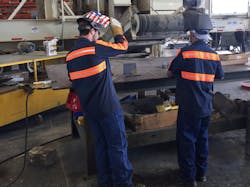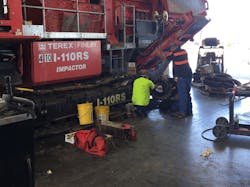Dealer Brings in the Technician Talent
General Equipment & Supplies, Fargo, North Dakota, has invested heavily in workforce development, creating a position specifically tasked with not only recruiting, but also retaining quality employees. Five years ago, GES hired Ann Pollert as its director of workforce development, with an original assignment to recruit apprentices and create a training partnership with a local technical school. As that program has flourished, her role has expanded to include oversight of workplace culture and retention.
“We recruit, we train, we retain, and then we re-recruit,” Pollert says.
Last year, GES launched an apprenticeship program for technicians in the aggregate-equipment side of the business, approved by the U.S. Department of Labor. She said there’s not a school in the nation teaching what General needs for an aggregate-equipment technician.
“Rolling stock is a lot more electrical, hydraulic, diagnostics, cylinders, whereas aggregate is fabrication, welding,” she says. “I can send someone to a welding class, but that’s not going to make him a good aggregates technician. He needs to learn on the job with us.”
Apprenticeships help GES in that area, but the majority of the work remains in servicing heavy earthmoving and light equipment. To that end, Komatsu America launched a program with North Dakota State College of Science (NDSCS) called the Komatsu Partnership Program. NDSCS offers a two-year diesel technician track, resulting in an Associate’s degree, but students’ exposure to heavy equipment was limited, Pollert says. The Komatsu program focuses on heavy construction equipment and it is available to any Komatsu dealer. See the video below.
“When we’d hire a general diesel technician, they had great knowledge of systems, but didn’t have a lot of construction experience,” Pollert says. “[Now,] they have extensive Komatsu experience and are way more advanced in their training.”
The two-year program includes internships and job shadowing, which begin the summer before enrollment at NDSCS, and includes summers and school holidays. Students are hired as GES employees and remain an employee during their schooling. That first summer serves as a screening process: Students experience what the job entails and decide if they really want to embark on the career; and General can evaluate work ethic, attitude, and their willingness to learn.
“Do they make us money?” says Pollert. “No, they cost us money. If any of those students come in here and say, ‘This isn’t right for me,’ that’s a good thing. I don’t want to put them through school for two years and then have them say, ‘This isn’t the career for me.’”
The two-year process consists of classroom and lab study at NDSCS, supplemented with three paid, eight-week internship experiences in one of GES’s shops. The first seven months of their first year at NDSCS, students learn the same basic material as general diesel technicians, regardless of brand. “After that, everything they see is Komatsu,” Pollert says.
“In March, they spend eight weeks back in the shop,” she says. “Now they’re of value. Now they have a tool set; now they do a lot of basic repairs. They go back to school for eight weeks; come back again for eight weeks. Now they’re getting more valuable. They know a little bit more; they’re confident. They go back for eight weeks, come back again for eight weeks.
“During the final internship, they’re pretty valuable and it’s hard to let them go back to school. They do know what they’re doing, they’re a huge asset to the company. They go back to school for their final eight weeks and graduate in May.
“Our relationship starts [that first] summer, and it continues the entire time they’re in school,” she says. “So, when they graduate, they’re guaranteed a job.”
GES reimburses 70 to 100 percent of tuition and fees, based on grades, over a three-year period while they work for the dealership. Pollert’s priority each year is to recruit eight to 10 students to bring into the program, guaranteeing a steady flow of new technicians to feed the service requirements of the dealership. She says they haven’t lost any of the first four graduating classes.
Pollert emphasizes that it’s not about hiring technicians, but about providing career opportunities within GES for young people. As technicians are promoted to supervisors, for example, graduates from the program can be ready to advance. Her additional role of retention kicks in.
“We show them a career path,” she says. “Parents will say to me they don’t want their kid to be a diesel technician their whole life. I don’t want that for your kid either. Once they have all the knowledge, they could be beneficial in many other roles in the company. That knowledge is critical, and we need it in other roles like foreman, service manager, sales, product support. Now that eight-year guy is huge to me.
“How do we make sure we’re engaging his family enough, how do I ensure he likes coming to work every day, how do we make sure his pay is competitive.”
Pollert’s strategy of placing people at the center of General’s future is paying off. Walking the shop, Pollert calls everyone by name, asks questions and interacts with each employee, and usually leaves a string of smiles on the faces behind her.
More on the North Dakota State College of Science diesel program below:

